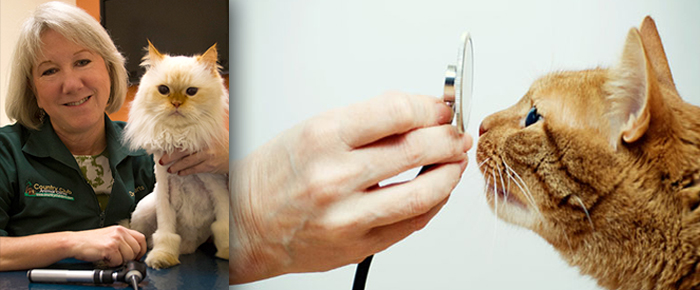
By Janet McAfee
After more than 25 years of practice, Dr. Lillian Roberts DVM, still loves what she does for living – – keeping our Coachella Valley pets healthy and happy. She operates Country Club Animal Clinic in Palm Desert. Dr. Roberts explains why she loves being a veterinarian, “Whether it’s a wellness visit or a challenging medical or surgical case, I take pleasure in making every client experience a positive one. I look forward to interacting with my patients and consider many of their owners to be personal friends.” Dr. Roberts authored four books, including the Andi Pauling veterinarian mystery series. She supports numerous animal related charities, and serves on the board of Loving All Animals.
Dr. Roberts is pictured here with her cat, Torchie Pooh Bear. Torchie was her patient from the time he was a kitten. Over the years, the cat lost a leg to cancer, and later lost his vision due to retinal disease. When Torchie’s human was dying from cancer, he asked Dr. Roberts to take him. This special needs kitty doesn’t let anything hold him back, climbing up on Dr. Roberts’ desk and sleeping on the printer. Dr. Roberts has the following advice to help keep your pet healthy:
Q: WHEN SHOULD I TAKE MY PET TO THE VET?
A: For the typical young, healthy adult pet, most vets recommend yearly wellness visits, in addition to those times when you seek care because you notice something wrong with your cat or dog. This should include a thorough physical exam, discussion of findings, and a plan to address any abnormalities.
Q: WHAT CONSTITUTES A THOROUGH PHYSICAL EXAM?
A: The animal is weighed, temperament and heart rate taken, and a brief medical history recorded by the vet’s assistant. The doctor observes the animal from the moment they enter the room, assessing the overall body condition score, skin and coat, attitude, demeanor, and gait before the official exam begins. I like to sit down and watch the pet move about the room if appropriate, while asking the owner questions about how they perceive their pet’s health.
Next, I run my hands over the animal. This soothes their anxiety and tells me about the condition of their skin and coat, presence of lumps, and if the fur is long or bushy. It tells me about their weight and condition beyond what a visual check can. Speaking calmly to the pet and the owner, I look at the eyes, the face, the nose, then I lift the lips on each side to check the teeth, gums, and other oral structures. I peek into each ear, then gently feel the glands of the throat. I feel under the front legs, over the ribs, and then gently palpate the abdomen for signs of pain, tenderness, masses, or enlarged organs. I peer under the tail, run my hands over the limbs, before listening to the heart and lungs. If anything unusual is found, additional attention is given to that area.
Q: I CAN GET MY PET’S SHOTS AT A WALK-IN CLINIC. WHY SPEND MONEY ON A VET?
It’s amazing how often I find dental disease, heart murmurs, weight issues, even tumors the owner was unaware of. In most cases, pets the owners considered healthy have no urgent medical problems. But just as in humans, early detection is key.
Q: HOW DO I KNOW MY PET IS SICK ENOUGH TO GO TO THE VET? WHAT IS AN EMERGENCY?
Every pet is different when it comes to signs of illness. Cats often hide their symptoms. Seek vet help IMMEDIATELY in the case of difficulty in breathing, sudden collapse, bleeding anywhere that doesn’t stop within a few minutes, persistent coughing or coughing that interferes with normal activity, or a seizure that lasts for more than a few minutes. Immediate treatment should also be sought when you know your pet ingested a toxic substance, has a sudden change in the appearance of an eye, persistent gagging or retching without vomiting, sudden lameness (limping), or obvious distress even without specific symptoms.
Request a same-day appointment for vomiting (not continuously) for more than a day, diarrhea lasting 3 days or more, severely decreased appetite for longer than a day, or sudden onset of restlessness or unusual vocalization.
Schedule an appointment at your earliest convenience in case of head shaking, scratching, or scooting that goes on more than a short while. Other reasons for a future appointment include bad breath, pawing at the mouth, noticeable weight gain or loss, swollen abdomen, hair loss, skin lumps, change in gait, unfamiliar odor, or any unusual new behavior.
FINAL TIPS FROM DR. ROBERTS
None of these lists of symptoms is meant to be complete. If you have a question, call your vet. You are in the best position to know when something is wrong with you pet. Call ahead to let your vet know you are coming in. Keep your vet’s phone number, number to the 24-hour vet clinic, and the Pet Poison Hotline (800-213-6680) in your cell phone’s speed dial.
YOUR’RE INVITED! COUNTRY CLUB ANIMAL CLINIC OPEN HOUSE EVENT, JANUARY 22
Come meet Dr. Roberts and her staff at their open house event to benefit Loving All Animals, 4:00pm to 6:00pm, Thursday, January 22. Country Club Animal Clinic is located at 36869 Cook St, Palm Desert, in the business park near Gerald Ford. Food, drinks, prizes, tours and adoptable rescue dogs will be featured. A $20 donation to Loving All Animals will support their work for homeless animals. Contact Country Club Vet Clinic at (760) 776-7555.












































